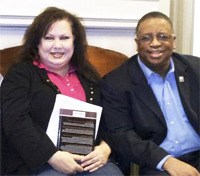It wasn’t long ago when Lizzie Reid was sitting in a similar seat at the Washington Corrections Center for Women near Purdy, listening to the same testimonies.
The last of the speakers, Reid knows the prisoners have heard all the statistics before, and many times that’s not enough to convince them to turn their lives around.
As she steps up to address the group, Reid leads them down memory lane instead, retelling her own story of how she, a former prisoner, is now on the career path to becoming a practicing attorney in public service law.
Once a prisoner of her past mistakes, the Kent woman is telling a different story of hope and purpose today.
Reid, a no-nonsense and engaging woman, makes her way around the state to speak to prisoners, motivating others with her own words as an ambassador for the changes she made that have turned her world around.
“I always like it when I get to make the men cry,” Reid said. “I think it’s because they hear the possibilities because I’m calling them on their b.s., and I don’t want to hear those excuses. I used to have the same excuses.”
A new life, and school
As she sips her coffee at Kent Station, Reid looks outside the window of the coffee shop toward a Green River Community College building, just minutes away from where she lives, where she’s attended classes for the past two years after being released from prison.
“I never really contemplated education or college,” Reid said. “(But I have) tried everything else.”
Over the course of 10 years, Reid had been in and out of some kind of trouble. The first incident being what they called “obtaining a controlled substance by misrepresentation.”
Within that 10-year period, five trouble-free years went by, during which Reid picked up a night job working at a warehouse.
“I was actually trying to do the right thing because I didn’t want to get in trouble again,” she said.
But when the company was sold, she found herself jobless. Not able to pay her bills or find work, Reid felt like her options were limited.
“When you get backed into a corner, it’s just too easy to do it,” she said. “When those connections are there, you know how to make money even if it is illegal.”
So in 2010, Reid was again arrested for marijuana possession and put in prison.
“I grew up to become the drug dealer they wanted me to be, that I was expected to be,” said Reid, who grew up in a difficult family situation fraught by criminal activity.
But by the end of her latest stay in prison, Reid had made up her mind that she would never come back.
Reid filled out the paperwork to apply to GRCC. Within 12 days of being released after her eight-month sentence, Reid was sitting amongst classmates, textbooks by her side, ready to try out this new route.
And to her surprise, Reid did better in class than she ever expected, learning more about her skills as a writer and public speaker that she never knew she had.
Since starting school, Reid’s submitted two separate essays, one to the Yale Law Journal, the other to Harvard Press, that were published.
Realizing she has a natural knack for putting words on paper, Reid decided that when she transfers to the University of Washington in the fall, she’ll double major in law, societies and justice and English.
“Communication (is) the biggest way to reach people,” she said. “Using writing skills in furtherance of the social justice and public policy issues I see … combining the two can help reach a larger audience.”
Reid also noticed her natural ability to speak in front of crowds when she addressed 500 people at UW’s Kane Hall as a guest speaker for the first time.
“I’m still shaking my head,” she said. “I didn’t see it as that spectacular, but apparently there’s something in (my speeches) that is making people relate and accept the ideas.”
The speaking tour include prisons throughout the state, an opportunity to touch others and make a difference. It is a part of her busy life.
Reid hopes to continue her education at the UW law school in the next few years. Her goal is to bring to light the issues people in prisons face while addressing the circumstances that lead children down the path to criminal lives.
“I never had a voice for many years,” Reid said. “Now that they’ve given me one, they can’t shut me up. And I absolutely intend to be the voice for those who are still behind me, voiceless.”
Talk to us
Please share your story tips by emailing editor@kentreporter.com.
To share your opinion for publication, submit a letter through our website https://www.kentreporter.com/submit-letter/. Include your name, address and daytime phone number. (We’ll only publish your name and hometown.) Please keep letters to 300 words or less.

